Blue Christmas
by Pastor Chris Deneen
I’ll Have a Blue Christmas, this year and each year.
This year, here at Our Savior, we are having a special service during Advent, a Blue Christmas service.
For many people, the holiday seasons are bright, they are filled with joy, they are holly and jolly, filled with gatherings, laughter, and moments that will make memories for a lifetime.
For many others, the holiday season isn’t always bright. It isn’t filled with joy, but with struggle. It isn’t filled with laughter, but tears. It isn’t filled with moments that will make memories for a lifetime, but it is a season that is left with just the memories of years that were holly and jolly. For many, this holiday season, is going to be blue.
That is where our Blue Christmas service comes in. This service is meant for those who are struggling this Christmas season. For some, it may be that they lost a loved one this year, in recent years, or at anytime and the grief weighs heavier during the holiday season. For others, it may be that they lost a job and aren’t sure what the next few days, weeks, or months may look like. For others, it may be that their holiday season has been turned completely upside down for whatever reason. For others, it may be a season where they feel alone. There are many reasons why someone might be having a blue Christmas.
I had never personally heard about a Blue Christmas service, until last year, the holiday season of 2022. About a week before Thanksgiving, I got a phone call from my Aunt. I had actually woken up to about 40 missed calls from my dad and my aunt. And then about 3:40 or so in the morning, I answered the phone. My mother had gone to be with Jesus. My mom had health concerns in the past, a major stroke in 2018, but for the most part she was doing well. It was an absolute shock. I, writing this today, can tell you that news changed everything for me. That day I got the phone call, I was originally scheduled to take my oldest daughter, Ida, to a Christmas play in Midland, MI with her “grammy,” my mom. That changed that day. It was the week before Thanksgiving, where I was scheduled to preach on Thanksgiving Eve, and at chapel at our school. That changed that day. We were still figuring out Thanksgiving plans. That all changed when we went from preparing a meal on Thanksgiving, to a funeral the day before Thanksgiving. Then I had to think about how, after Thanksgiving, the world would shift to the bright lights, the twinkling stars, the joyous season of Advent, as we prepare for Christmas. But for me, in the winter of 2022, I had something change: my mom, now celebrating the great celebration with Jesus, would no longer be at our Christmas, and for me, my Christmas was looking and feeling blue.
I will always carry the memories that I have of Christmases past with my mom. But there is no longer the opportunity to make new memories. At a meeting of area Lutheran churches, I found out that a sister congregation, Martin Luther Chapel on MSU’s campus, was having a Blue Christmas service.
I had no idea what it would look like. I had no real idea what to expect, but I went. And brothers and sisters, as sure as you are reading this blog post,
I am so glad I went.
In the long, dreary, dark days of the winter in Michigan, when days are dark longer than they are bright, where we often can go days or weeks without seeing the sun, where the darkest day of the year resides just days before Christmas, I am so glad I went.
Because what I experienced was this:
A raw, emotional, worship service, centered on the hope and joy of Jesus. Was it a dark day when I went? Absolutely, both metaphorically and literally. Was I having a blue Christmas? Absolutely.
But.
I was able to receive the word of God. I was able to know that I was not alone in my grief. I was able to, in the midst of a dark, dreary, blue Christmas, see the hope and light of Jesus that shines brighter than even the darkest of nights. I was able to hear and be reminded of this truth: My mom is with Jesus. That doesn’t turn the blue Christmas to bright and cheery, but it brings that glimmer of hope in the midst of the darkness.
That doesn’t mean that I won’t still grieve during the holiday season. That doesn’t mean I won’t get choked up almost every time I hear “Silent Night.” But it makes those dark, dreary nights and days and months seem a little less dark as the focus gets pointed back to the Light of the world. The Light who shatters the darkness, who shines within our lives, and who shines through others. No matter how blue or dark your Christmas may be, there is a light, there is THE light, who shines amidst the darkness. I pray that you can experience the light in the darkness at our Blue Christmas service on December 20th at 7 pm.
To answer a few questions that you may have:
Q: Who is invited to the Blue Christmas service? Is it only for people who have lost a loved one?
A: All are invited to join us. We are having this service especially for those people who are struggling with any kind of grief this Christmas season. We invite those who are struggling with addiction, depression or anxiety to join us. We invite those who mourn the loss of loved ones. We invite those who are lonely. We invite those who are battling illness or disease. We invite those who feel completely overwhelmed this holiday season. We invite those who are affected by war, whether they lost loved ones or know those who are near war-torn areas.
Q: Is this only for members of Our Savior?
A: No. If you are reading this, you are invited. And you are invited to invite someone you know that would be blessed by this service. This is a service meant to bring the hope and joy of Jesus to anyone who is struggling with any kind of hardships this Christmas season.
Q: What should I expect?
A: We will have a worship service, that gives adequate time to meditate and focus on the word of God. We will also have a time during the service where you may light a candle to bring your prayer before God. After the service, our Stephen ministers, trained, confidential, Christian listeners, will be willing to listen and pray with you. There will also be a time following the service for our service of healing, a time to be anointed with oil and prayed over. We will also have some light refreshments after the service, for a time of community.
Q: Is there a way for ongoing care from Stephen Ministers?
A: Absolutely. Our Stephen ministers are ready and willing to be that listening ear as you go through a hard time or season of life, through struggles, whatever that may be. They have extensive training and are ready to care for you. We pray that our Stephen ministers would be an extension of the love of Christ. If you are interested in meeting with a Stephen minister, and being paired up with one, you can contact our Church office, and our administrative assistant, Sue Sundstrom, will work with you on that confidential pairing.
Mission Middelburg 2023
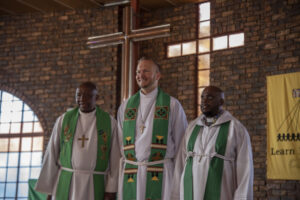
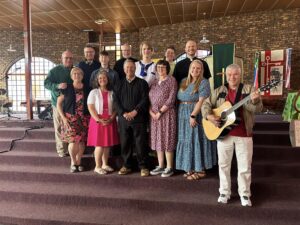 worshippers and leadership continued on without missing a beat! We were blessed as the liturgy and even transitions between parts of the service were all done in song. The youth, about 14 of them, came up to dance and sing a couple songs. The elderly women’s choir sang, too. Pastor Khumalo’s wife, Lindiwe, was among them and was the song leader. We enjoyed noting that most of those choir members followed words in print, but Lindiwe use her phone! The OSL Mission team joined in with familiar songs and we sang two songs we had prepared to share before the congregation. They enjoyed our praises and one of the church board members later told us, “Next time 5 songs, not just 2!!”
worshippers and leadership continued on without missing a beat! We were blessed as the liturgy and even transitions between parts of the service were all done in song. The youth, about 14 of them, came up to dance and sing a couple songs. The elderly women’s choir sang, too. Pastor Khumalo’s wife, Lindiwe, was among them and was the song leader. We enjoyed noting that most of those choir members followed words in print, but Lindiwe use her phone! The OSL Mission team joined in with familiar songs and we sang two songs we had prepared to share before the congregation. They enjoyed our praises and one of the church board members later told us, “Next time 5 songs, not just 2!!”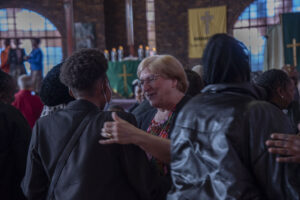 The service was extra special because Bishop Tswaedi was reinstating music leadership to unify the congregation and give them direction. He also commissioned two church planters to grow the Kingdom of God in their area. Pastor Wangelin preached the sermon and included some Zulu sentences which brought them joy and encouraged fellowship between us. Another highlight was seeing the gifted stained glass window that OSL presented to Pastor Mandhlo Khumalo before he left the U.S. in the entrance to the church and the previously given yellow, “Learn, Live, Share Christ” banner displayed near the altar. The team had brought two new banners to present to the congregation, which we presented during the service to Lindiwe
The service was extra special because Bishop Tswaedi was reinstating music leadership to unify the congregation and give them direction. He also commissioned two church planters to grow the Kingdom of God in their area. Pastor Wangelin preached the sermon and included some Zulu sentences which brought them joy and encouraged fellowship between us. Another highlight was seeing the gifted stained glass window that OSL presented to Pastor Mandhlo Khumalo before he left the U.S. in the entrance to the church and the previously given yellow, “Learn, Live, Share Christ” banner displayed near the altar. The team had brought two new banners to present to the congregation, which we presented during the service to Lindiwe  Khumalo. One stated, “The Lord is My Shepherd” and the other, “Praise the Lord of All Nations!” They also had an awesome close to worship with praises being sung while the youth danced a Congo line out of the church!! During the worship service while we were singing together, I couldn’t help but picture how majestic, loud, and joyful Heaven will sound as all nations and every language will be in praise together for our victorious Jesus! What a bond we have with God’s family in the world, through His Word, His Grace, and song. Truly, to God be the Glory!
Khumalo. One stated, “The Lord is My Shepherd” and the other, “Praise the Lord of All Nations!” They also had an awesome close to worship with praises being sung while the youth danced a Congo line out of the church!! During the worship service while we were singing together, I couldn’t help but picture how majestic, loud, and joyful Heaven will sound as all nations and every language will be in praise together for our victorious Jesus! What a bond we have with God’s family in the world, through His Word, His Grace, and song. Truly, to God be the Glory!By: Ryan Couser
 Dear Our Savior Family, This is Ryan Couser and I had the privilege to be a part of the 2023 South Africa Mission Team. One of the memories I would like to tell you about is the day we spent at Doornkop, helping Mama Grace with her feeding Scheme. Although we think of the word scheme as
Dear Our Savior Family, This is Ryan Couser and I had the privilege to be a part of the 2023 South Africa Mission Team. One of the memories I would like to tell you about is the day we spent at Doornkop, helping Mama Grace with her feeding Scheme. Although we think of the word scheme as 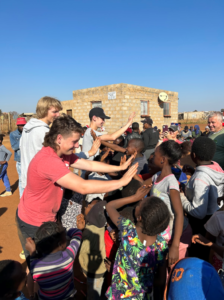
 We spent a long couple hours in Doornkop because we were busy playing frisbee, 4 square, soccer, and playing with jump ropes. Once the food was ready we had the kids line up and get their food of rice with a type of stew on top. Even after their meal they wanted to play with us some more which was cool to see. I liked the way we ended the day because we sang a couple more songs and prayed a prayer of blessing over the families, Mama Grace and this food ministry. My final memory I will never forget was after our closing, Ben, Alexander, and I started giving high fives to the children, and they wanted so many high fives I probably did the same kid five times. This day’s visit was very moving and was a great demonstration of the work God is doing, building up the kingdom all the way in Doornkop, South Africa.
We spent a long couple hours in Doornkop because we were busy playing frisbee, 4 square, soccer, and playing with jump ropes. Once the food was ready we had the kids line up and get their food of rice with a type of stew on top. Even after their meal they wanted to play with us some more which was cool to see. I liked the way we ended the day because we sang a couple more songs and prayed a prayer of blessing over the families, Mama Grace and this food ministry. My final memory I will never forget was after our closing, Ben, Alexander, and I started giving high fives to the children, and they wanted so many high fives I probably did the same kid five times. This day’s visit was very moving and was a great demonstration of the work God is doing, building up the kingdom all the way in Doornkop, South Africa.What is Advent?
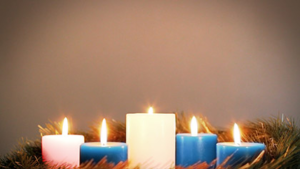
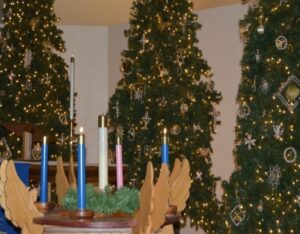 One of the main ways that we celebrate Advent, and a way that you can celebrate Advent at home during this season, is by lighting an Advent wreath, which you will see at the front of the church during Advent! An Advent wreath is a wreath, with 4 or 5 candles. The 4 candles have specific meanings. The first two candles, which are blue or purple, stand for hope and peace. Hope and peace are two of the main components of Advent. As we wait for the coming of Jesus, as we wait for Christmas, we wait with hope! We wait knowing that Jesus has come into this world, and through His life, he saved us from our sins. The hope that we have is that it isn’t on our doing, but what Christ did coming into this world, as a gift from God, as we read in Ephesians 2:8-9, “For it is by grace you have been saved, through faith—and this is not from yourselves, it is the gift of God—not by works, so that no one can boast.”
One of the main ways that we celebrate Advent, and a way that you can celebrate Advent at home during this season, is by lighting an Advent wreath, which you will see at the front of the church during Advent! An Advent wreath is a wreath, with 4 or 5 candles. The 4 candles have specific meanings. The first two candles, which are blue or purple, stand for hope and peace. Hope and peace are two of the main components of Advent. As we wait for the coming of Jesus, as we wait for Christmas, we wait with hope! We wait knowing that Jesus has come into this world, and through His life, he saved us from our sins. The hope that we have is that it isn’t on our doing, but what Christ did coming into this world, as a gift from God, as we read in Ephesians 2:8-9, “For it is by grace you have been saved, through faith—and this is not from yourselves, it is the gift of God—not by works, so that no one can boast.”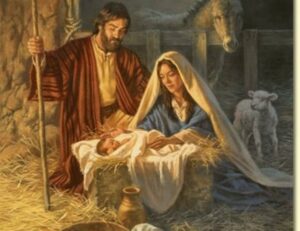 Finally, the last candle, which is blue or purple, stands for love. None of this, Advent, Christmas, Jesus coming into the world, would be possible without God’s love for us. In John 3:16, we read, “For God so loved the world that he gave his one and only son, that whoever believes in him shall not perish but have eternal life.” That love is what brought Jesus to the earth. That love is what we celebrate during Advent.
Finally, the last candle, which is blue or purple, stands for love. None of this, Advent, Christmas, Jesus coming into the world, would be possible without God’s love for us. In John 3:16, we read, “For God so loved the world that he gave his one and only son, that whoever believes in him shall not perish but have eternal life.” That love is what brought Jesus to the earth. That love is what we celebrate during Advent.150 Years of Lutheran Education
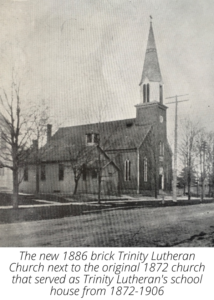
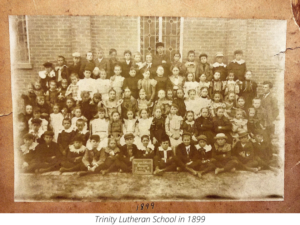
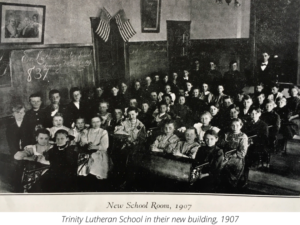 churches of that era. Classes were held in the church building built in 1872, and when the congregation built a new sanctuary in 1886, the old church continued to serve as the school building.
churches of that era. Classes were held in the church building built in 1872, and when the congregation built a new sanctuary in 1886, the old church continued to serve as the school building.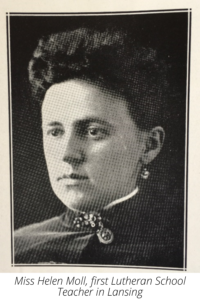
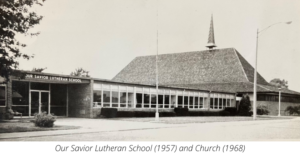

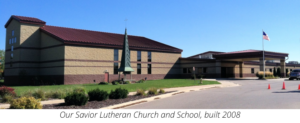 In the 1990’s, the church and school buildings were in need of greater repair and investment, while the families being served were scattered across the greater Lansing area. The original families who lived near the church were now older and their kids were grown. The school began to decline. After prayerful discernment, the church leadership proposed that the church consider moving to a new location that would better serve the greater Lansing area where the school ministry could thrive again. This
In the 1990’s, the church and school buildings were in need of greater repair and investment, while the families being served were scattered across the greater Lansing area. The original families who lived near the church were now older and their kids were grown. The school began to decline. After prayerful discernment, the church leadership proposed that the church consider moving to a new location that would better serve the greater Lansing area where the school ministry could thrive again. This 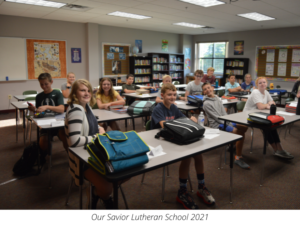 would be another bold move for the Kingdom that required sacrifice and commitment to the ministry. Land was donated to the church in Delta Township, and in 2008, construction began on a new church and school simultaneously. Once again, the church worshipped in the school gymnasium for a brief time until the sanctuary was completed. The building was dedicated on November 2, 2008, with Lutheran Hour Speaker Ken Klaus delivering the dedicatory sermon. The church was to be a house of prayer for all nations.
would be another bold move for the Kingdom that required sacrifice and commitment to the ministry. Land was donated to the church in Delta Township, and in 2008, construction began on a new church and school simultaneously. Once again, the church worshipped in the school gymnasium for a brief time until the sanctuary was completed. The building was dedicated on November 2, 2008, with Lutheran Hour Speaker Ken Klaus delivering the dedicatory sermon. The church was to be a house of prayer for all nations.Good Friday Prayer Guide
Tre Ora (The Three Hours)
God
Psalm 33:18 –“The eyes of the LORD are on those who fear Him, on those whose hope is in His everlasting love.”
Prayer Starter: Lord God, Heavenly Father, Your heart was broken when You had to send Your Son, Jesus, to the cross for the sins for which I, and all the world, deserved judgment. May my heart be broken as well, Father, for the things which break Your heart.”
Hebrews 12:2 –“Let us fix our eyes on Jesus, the author and perfecter of our faith.”
Psalm 62:1 –“My soul finds rest in God alone; my salvation comes from Him.”
2 Peter 1:2 –“Grace and peace be yours in abundance through the knowledge of God and of Jesus our Lord.”
Matthew 1:47 –“My spirit rejoices in God, my Savior.”
51, 22, 103, 86, 69, 63, 119:169-176
The Seven Last Words on the Cross
Luke 23:34 – “Father, forgive them, for they do not know what they are doing.”
Luke 24:43 – “Today you will be with Me in paradise.”
John 19:26-27 –“Dear woman, here is your son. Here is your mother.”
Matthew 27:46 –“My God, my God, why have you forsaken Me?.”
John 19:36 – “I am thirsty.”
Luke 23:46 – “Father, into Your hands I commit My spirit.”
John 19:30 – “It is finished.”
Easter Devotion
Easter Devotion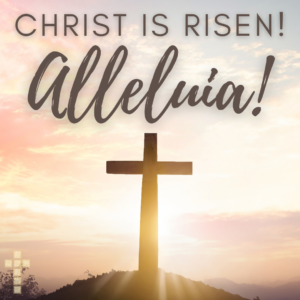
As we celebrate Easter, we are reminded that Jesus is no longer in the tomb! He is risen indeed! This is the greatest news ever. Christ was laid in the tomb on Friday, but death could not conquer our Lord who is victorious over sin, death, and Satan. That changes everything: our past, present, and future, and we are granted new life.
–Romans 6:6
We were once enslaved to sin, but through the death and resurrection of Jesus we are no longer held in that past. We no longer live as we used to, held down by our own sinful ways. Our sins were taken to the cross by Christ and He has forgiven us. The past is no longer what defines us. We are defined by the cross of Christ, which sets us free, and makes us heirs to the kingdom of God.
Future
“He has caused us to be born again to a living hope…to an inheritance that is imperishable, undefiled, and unfading, kept in heaven for you.”
–1 Peter 3:3-4
We have been given an inheritance that cannot be measured. On the cross, Christ won for us eternal life. Through that death and resurrection we are made heirs with Christ to the heavenly kingdom! While we are new creations here on earth, we can be certain that our eternal life has been won for us.
Prayer
Share prayer requests with each other and also pray for those who are not able to be with you.
Let us pray: Almighty God, we thank you for sending your Son, our Savior, Jesus into this world, in order that we might be saved from sin, death, and the devil. Give us hearts of hope and joy to share your light into this world. Remind us that we are no longer enslaved to sin, but we are freed by the sacrifice that Jesus made for us. Amen.
-Luke 24:6
Celebrating Baptism Birthdays
When we have something worth celebrating, we need to celebrate it! As the dreary days of January turn to February then turn to March, as winter drags on, there’s always a time for celebration. What a gift God has given us in our baptisms, something worth not just remembering daily, but celebrating daily. Here at Our Savior, we love baptisms. They are always an exciting addition to a Sunday service, as we get to welcome the newest member of God’s family and Our Savior! In baptism God adopts us as His children, and we receive this gift joyously, as God gives it freely.
In baptism, we receive several gifts, wrapped up into this one divine gift, given through ordinary water with the Word of God. We receive the forgiveness of sins (Acts 2:38), the Holy Spirit (Acts 2:38), and eternal life (Romans 6:4). What a great gift and joy baptism is and definitely worth celebrating! In baptism we are washed clean of our sins, and made righteous before God. (Titus 3:5-7) The Holy Spirit, the sanctifier, works saving faith within us, and helps us to grow and be strengthened in our faith. Finally, we receive eternal life. As we are baptized into Christ, into His death, the words from Paul ring true, “We were therefore buried with Him through baptism into death in order that, just as Christ was raised from the dead through the glory of the Father, we too may live a new life.” (Romans 6:4)
 What a joy that is! What a wondrous gift we’ve been given by our Heavenly Father, as he adopts us into His family, and gives us that new birth, that regeneration. We hear Jesus talking about this new birth in His conversation with Nicodemus in John 3. Jesus tells Nicodemus that in order for one to be saved, they must be born again. Nicodemus is very unsure about what Jesus means. Jesus explains it this way in John 3:5-6, “Very truly I tell you, no one can enter the kingdom of God unless they are born of water and the Spirit. Flesh gives birth to flesh, but the Spirit gives birth to spirit.” When we are baptized, we are made new creations, and we are given new life, a life to live as holy, chosen people of God.
What a joy that is! What a wondrous gift we’ve been given by our Heavenly Father, as he adopts us into His family, and gives us that new birth, that regeneration. We hear Jesus talking about this new birth in His conversation with Nicodemus in John 3. Jesus tells Nicodemus that in order for one to be saved, they must be born again. Nicodemus is very unsure about what Jesus means. Jesus explains it this way in John 3:5-6, “Very truly I tell you, no one can enter the kingdom of God unless they are born of water and the Spirit. Flesh gives birth to flesh, but the Spirit gives birth to spirit.” When we are baptized, we are made new creations, and we are given new life, a life to live as holy, chosen people of God.
If you have been given a new birth, then you have to celebrate that. Going from enemies of God to part of His family and heirs to the eternal heavenly kingdom?? That is worth celebrating!
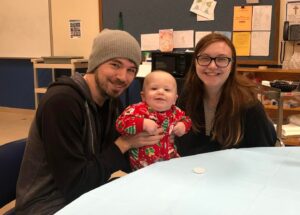 Here at OSL, that is exactly what we did.
Here at OSL, that is exactly what we did.
This past calendar year, 2021, in the midst of the COVID pandemic, we had 33 baptisms. 33! That is a huge number. A big year here is hitting double digits. 33, that is a great number, and all thanks be to God for that. Of that number, we had 6 adults, 14 infants, and 13 students. Normally we would expect to have a majority of infants, but this past calendar year we had more students and adults than infants. Thanks be to God for the ministry that we are able to do through our school and early childhood center.
At the beginning of December, there was a meeting with some volunteers, and the planning for the Baptism Birthday party was underway. One of the major things we had to decide, was how do we celebrate this gift of God? As any good party goes, we knew we would need a few key items. Refreshments, cake of some kind, and a gift bag. We had a great spread of each of these. We had some wonderful refreshments, some cupcakes to keep things a little more individualized, and a gift bag for each of those who were baptized. And on January 9th, as we celebrated the baptism of Jesus in our services, during our coffee hour, we celebrated.
 In the gift bags we had several items to celebrate and remind those baptized of their baptism. One of the main things, were two baptismal stickers. One was a sticker reminding, “I am Jesus little lamb.” This is a great reminder, that we are made children of God, sheep of our Great Shepherd. The other sticker that each baptized person received, was, “God’s own child I’ll gladly say it, I’ve been baptized into Christ.” This reminds of that great gift of being adopted into God’s family.
In the gift bags we had several items to celebrate and remind those baptized of their baptism. One of the main things, were two baptismal stickers. One was a sticker reminding, “I am Jesus little lamb.” This is a great reminder, that we are made children of God, sheep of our Great Shepherd. The other sticker that each baptized person received, was, “God’s own child I’ll gladly say it, I’ve been baptized into Christ.” This reminds of that great gift of being adopted into God’s family.
We also had a baptismal Chrismon in each gift bag as well. It was in the shape of a star with a cross in the middle. This “Christ monogram,” was another reminder of how through baptism, we are baptized into Christ, His death and resurrection.
Along with other small candies in the bag, we also had an age appropriate gift. All of our students and infants under the age of 8 received a stuffed lamb. This is a reminder that we are lambs of God, and at the same time, something for those children to be able to physically hold onto and cling to, reminding them of their faith in Christ.
 The students that were between the ages of 11 and 14, received a wall cross that they could put up in their rooms, and have as a daily reminder of their baptism into the death of Christ. Finally, the adults received a devotional booklet. This is a way for them to continue to grow in their faith at a deeper level.
The students that were between the ages of 11 and 14, received a wall cross that they could put up in their rooms, and have as a daily reminder of their baptism into the death of Christ. Finally, the adults received a devotional booklet. This is a way for them to continue to grow in their faith at a deeper level.
Why was this a focus for us here at Our Savior? Because it is absolutely something worth celebrating. When we receive gifts, we celebrate. When we see God working in our lives, we celebrate. When something amazing happens to our family or friends, we celebrate! If you have all three of these things happening at once, we have to celebrate! We give thanks to our God and Father, who invites us to come to the font, who invites us to partake in this sacrament, who invites us into His family. We celebrate the gift of God because HE gives us this gift freely, that we may receive forgiveness of sins, redemption and regeneration, and ultimately eternal salvation with our God and our King. Does that seem worthy of celebrating? Absolutely.
Our Savior Food Bank in a Pandemic
What’s been happening at the Food Bank lately?
This is a question we hear from people who know that the Our Savior Food Bank provides food assistance through the Greater Lansing Food Bank to hundreds of families in the South Lansing area. Thankfully, by God’s grace, the Food Bank continues to serve people with food, household supplies, gently used clothing, and smiles and hugs that radiate God’s grace and goodness.
A young woman came to the food bank the other day with a baby and small child. She was on her own after fleeing a violent husband who was abusing her and the children. As she was being  helped by the Food Bank volunteers, she asked if they had any diapers. She stated that if Social Services found out her baby didn’t have any diapers, she feared they would take the children away from her, and she began to sob. Director Sharon Miller asked the woman if she was willing to come around the corner, which she was. Members at Our Savior had given Sharon some Kroger gift cards, and said, “Give these to the people you think are the most in need.” Sharon gave the $50 Kroger gift card to the young mother and said, “Here, go and use this to buy some diapers. We’ll makes sure you have enough groceries. In fact, you can come twice a week instead of once a month, and we’ll take care of you.” The mom began to sob again, this time tears of joy. The little child with her looked up at Sharon and said, “I’m hungry.” Sharon had to hold it together as she helped this family get the food they needed.
helped by the Food Bank volunteers, she asked if they had any diapers. She stated that if Social Services found out her baby didn’t have any diapers, she feared they would take the children away from her, and she began to sob. Director Sharon Miller asked the woman if she was willing to come around the corner, which she was. Members at Our Savior had given Sharon some Kroger gift cards, and said, “Give these to the people you think are the most in need.” Sharon gave the $50 Kroger gift card to the young mother and said, “Here, go and use this to buy some diapers. We’ll makes sure you have enough groceries. In fact, you can come twice a week instead of once a month, and we’ll take care of you.” The mom began to sob again, this time tears of joy. The little child with her looked up at Sharon and said, “I’m hungry.” Sharon had to hold it together as she helped this family get the food they needed.
The Our Savior Food Bank has been supporting the food-insecure population of south Lansing since the mid-1990’s. It is located in the former OSL parsonage, where our first pastor, Pastor Bickel, and his wife Dorothy raised seven children, on the property at our former location on Holmes Road, just west of MLK. When Our Savior Lutheran Church and School relocated to Delta Township in 2008, the Food Bank was an important connection to our old neighborhoods.
Food Bank Director Sharon Miller coordinates over a dozen volunteers who work to organize and sort donations and process food orders from the clients served by the Food Bank. These clients come to us through the Greater Lansing Food Bank, which provides deliveries of food at discount prices and serves as a clearing house for requests. While our Food Bank needs to follow the rules and policies of the Greater Lansing Food Bank, we are still able to bring our own unique blessings to this ministry. Government-issued food stamps can only be used for food – things consumed by mouth – and do not cover any hygiene products or cleaning supplies that we often pick up at the grocery store in addition to our food. Our Food Bank offers a number of “extra items” in addition to groceries, including health and cleaning products, gently used clothing, frozen meat, and school supplies.

Not only does the Food Bank serve general clients through the Greater Lansing Food Bank, but there are special segments of the population that we particularly are there for. Our Food Bank is known by the Department of Veterans Affairs as having a special interest in assisting veterans, and so we get a number of them who have fallen on hard times. The Department of Mental Health utilizes our food bank, and often the case workers themselves come to shop on behalf of their clients, who are too unstable or violent to come to the Food Bank in person. These case workers express their appreciation for our Food Bank, the volunteers, and how this is a blessing to the people they serve. Another special group is parolees, who are often turned down by other Food Banks. Our Food Bank has welcomed them and helped them get on their feet.
Prior to the pandemic, the Food Bank was one of the largest in Ingham County, serving nearly 100 families a week (30-35 families 3x a week), almost 10,000 people a year. The reputation of the Food Bank was that it went the extra mile to get people the help they needed, with a loving and caring group of volunteers who work there.
During the shut-down in 2020, the Food Bank was also closed for several months. This weighed heavy on the hearts of the volunteers who knew the families they served and their needs. A number of mobile food pantries popped up to serve the community, and additional government assistance helped fill in some of the gaps. A lot of decisions had to be made when the Food Bank reopened in August 2020. How should the procedures and facility be modified? Which volunteers were healthy and confident of returning? What health protocols should be in place? The volunteers were willing to make it all work. Gary Kandler built a Plexiglas window at the service counter and framed it in. New procedures and protocols had to be learned and adapted. With mobile food pantries also serving the area, the Food Bank clients dwindled, and when they reopened they were open only two days a week, by appointment only, with the volunteers who were able and willing to return.
In the past year, the process for coming to the Food Bank has been streamlined and improved, and while several area food banks closed due to lack of participation, things are starting to pick up at the Our Savior Food Bank again. They are still open twice a day, but now serving up to 19 families a day. Sharon Miller says that while the worst cases tended to be the elderly in the past, now they see people of all ages who are in desperate need. People who were hunkered down during the pandemic in miserable conditions are now starting to reach out for help. The Food Bank is there to assist them.
Several people from the community have dropped off donations to the Food Bank, often unannounced and unaffiliated with Our Savior. A random gentleman from the neighborhoods recently came to the door and gave the volunteers $55 and said, “Here, give this to someone who could really use it.” He trusted the Our Savior Food Bank to help the people who needed it the most.
We pray that our Food Bank can continue to be a blessing to the community, especially through the pandemic. We anticipate numbers slowly but steadily increasing, and at some point we may need to go back to being open three days a week. The possibility lies in the future of expanding the services provided there, such as ELS classes, life improvement skills, and spiritual care of some kind.
For those who have fallen on hard times, and are in need of grace, they find that and so much more through the smiles, encouragement, and extra items at the Our Savior Food Bank.
Hmong Ministry Update
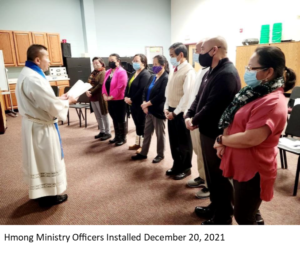 At our congregation meeting on Sunday, the congregation will be asked to assist Pastor Yang in continuing our Hmong ministry
At our congregation meeting on Sunday, the congregation will be asked to assist Pastor Yang in continuing our Hmong ministry
at Our Savior by issuing a divine call to continue his service at Our Savior. Here is some background to this request.
In 1978, Our Savior Lutheran began welcoming Hmong refugees to the US, helping them find housing, jobs, and a new life in the land of opportunity. They also shared Christ with them and welcomed them into our church and school community. For nearly 45 years, OSL has supported a Hmong worship service, led by Hmong LCMS pastors. We have 78 Hmong members of our congregation as of 2022. Our current Hmong pastor, Rev. Lang Yang, has been with us since serving as a vicar for Hmong ministry in 2004. You can learn more about the Hmong Ministry on our website.

Pastor Yang has been supported by three separate entities – St. Michael Lutheran Church in Richville, MI (where Pastor Yang has his residence and primary office), Our Savior Lutheran Church in Lansing, and the LCMS Michigan District in Ann Arbor. Pastor Yang’s
duties have been divided among those three entities, as he served the Hmong congregation in Richville, the Hmong congregation in Lansing, and the Hmong communities nationwide through the Hmong Mission Society, a mission supported by the Michigan District.
Due to dwindling numbers of Hmong families near Richville, this ministry is shutting down. St. Michael’s Richville will no longer be supporting their portion of Pastor Yang’s support. In order to fill that third portion, Pastor Yang has been training as an army chaplain and got certification in clinical pastoral education. He is looking for a part-time job as a chaplain to replace the third portion of income that had been from St. Michael’s.
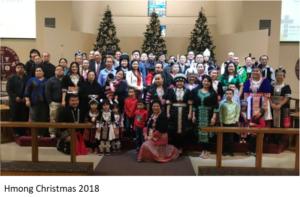
The Book of Life
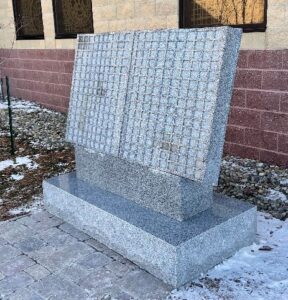
By Pastor Wangelin
The Our Savior Memorial Garden has a number of special features that give evidence to our Christian faith “in the resurrection of the dead, and the life of the world to come” (Apostles Creed). One of the most striking features of the garden is the large granite Book of Life, which is a sculpted monument weighing 5,500 lbs. in the shape of an open book, with 300 squares available to hold brass plaques that will have the name of each person buried in the garden and the years of their birth and their transfer to the Church Triumphant.
The Book of Life is mentioned in the Bible, in both the Old and New Testaments, and conveys the certainty and
assurance that God knows us and that we belong to Him. In this way, it is a fitting way to portray the names of those who have gone to be with the Lord in paradise and have received the crown of life. Their names are recorded on the sculpture just as the Bible says God records our names in His book of life.
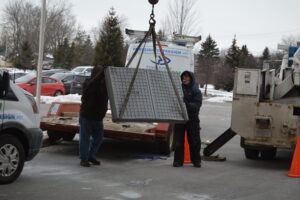
In any gathering or community, lists of names are drawn up to keep a record of who was there or who is officially a part of the group. Think of how many lists there are that your name appears on. Most of the time, it is a good thing that entities have our names written down with some information about us, especially our bank, the doctor’s office, service providers, memberships and subscriptions. Our names are written down to “make it official” and ensure that we get the benefits or services they offer. Our names are registered by the state to record our nationality and place of residence so that we get the benefits of being a citizen or resident. The Bible uses this same concept to describe how our names are known to God and that our salvation is secure. It is portrayed as a heavenly registry, listing the names of those made righteous by faith and saved by God.
Our salvation is “official” because our names are written in God’s Book of Life.
The specific phrase “book of life” appears seven times in the Bible (Psalm 69:28, Philippians 4:3, Revelation 3:5, 13:8, 17:8, 20:12, 21:27). Other Biblical references speak of God writing our names “in heaven” or in “His book” and that these books will be read on the Last Day (Exodus 32:31-32, Psalm 139:16, Daniel 7:9-10, 12:1-3, Luke 10:19-20, Hebrews 12:22-23). The following is a brief summary of what these Scripture passages say about the Book of Life.
Moses made the first reference to God’s book in the tragic incident of the golden calf. Moses made a desperate plea for God to forgive the sin of the people, otherwise to have Moses’ name “blotted out” of God’s book that He had written (Exodus 32:32). To be “blotted out” of the book would have meant no longer being listed among the people of God. David in Psalm 69:28 is confident that God’s Book of Life only lists the names of the righteous. Psalm 139:16 either refers to a different book, or indicates that more is written in God’s Book of Life than just our names. “All the days ordained for me were written in your book before one of them came to be.”
In the book of Daniel, the imagery of God’s book is given in connection to the final judgement. In chapter 7:9-10, God as the Ancient of Days sits on His throne to judge, “and the books were opened.” In chapter 12:1-3, it speaks of the Day of Resurrection at the end of the age.
“At that time Michael, the great prince who protects your people, will arise. There will be a time of distress such as has not happened from the beginning of nations until then. But at that time your people—everyone whose name is found written in the book—will be delivered. Multitudes who sleep in the dust of the earth will awake: some to everlasting life, others to shame and everlasting contempt. Those who are wise will shine like the brightness of the heavens, and those who lead many to righteousness, like the stars for ever and ever.”
In the New Testament, Jesus tells His disciples that they should rejoice, because their names are “written in heaven.” The Apostle Paul says that his companions and coworkers have their “names written in the book of life.” Philippians 4:3.
Similar to Jesus’ expression of rejoicing that our names are “written in heaven,” Hebrews 12:22-23 also connects joy with the names of God’s people (in this case the Church) written in His book.
“But you have come to Mount Zion, to the city of the living God, the heavenly Jerusalem. You have come to thousands upon thousands of angels in joyful assembly, to the church of the firstborn, whose names are written in heaven. You have come to God, the Judge of all, to the spirits of the righteous made perfect.
God is the Judge of all, and there will be a day of reckoning when all will be held accountable for their deeds. On the Day of Resurrection, the saints whom God made righteous by faith will be preserved for eternal bliss and enter everlasting life. These are the righteous whose names are written in the Book of Life.
The most references to the Book of Life are found in Revelation. In Revelation 3:8, Jesus makes this promise to those who are victorious and persevere in their faith, “I will never blot out the name of that person from the book of life, but will acknowledge that name before my Father and his angels.” This is an assurance from Jesus that our names will stand in God’s book and memory. Jesus knows us, we belong to Him, it is “on the books” and official!
Revelation 13:8 points out that those who have their names written in the Book of Life do not worship the beast or renounce their faith, especially during times of tribulation. It is the unbelievers, whose names are not written in the Book of Life, who are led astray by the evil in the last days. They are called “inhabitants of the earth” in Revelation 17:18, whose “names are not written in the Book of Life from before the creation of the world.” Here we see that the names in the Book of Life have been there since before we were born, even before the creation of the world, as a part of God’s eternal election and divine foreknowledge.
In the final judgement and new heavens and new earth of Revelation 20 and 21, the Book of Life plays a role where it says,
“And I saw the dead, great and small, standing before the throne, and books were opened. Another book was opened, which is the book of life. The dead were judged according to what they had done as recorded in the books.”
While the deeds in the books would condemn everyone, since “all have sinned and fall short of the glory of God,” (Romans 3:23) if someone’s name was written in the book of life, their deeds were not held against them and they are ushered into eternal life. “Anyone whose name was not found written in the book of life was thrown into the lake of fire” (Revelation 20:15). When the righteous enter the new heavens and the new earth – the heavenly Jerusalem – they are admitted because they are “those whose names are written in the Lamb’s book of life” (Revelation 21:27). Here the book of life is described as belonging to the Lamb, Jesus, since He was the one who died for them and purchased them with His blood. They live because Jesus lives.
I’d like to share two concluding thoughts on this topic of the Book of Life and the scriptures we have surveyed. The first one is how the Book of Life doesn’t play a huge role in the Bible, and yet it shows up in every section – from Moses in Exodus, to the Psalms and Prophets, once by Jesus, once by Paul, once in Hebrews, and a handful of times in Revelation. It is a truly biblical concept and not just found in one section or another. This makes the Book of Life a constant thread for God’s message that reflects its significance. God’s book of life was “written from before the creation of the world” (Revelation 17:8). This is a wonderful assurance that God knows us and knew of us even before creation. This fits with what Paul writes in Ephesians 1:4,
“For [God] chose us in [Christ] before the creation of the world to be holy and blameless in his sight. In love He predestined us to be adopted as His sons through Jesus Christ, in accordance with His pleasure and will.”
This is a powerful statement of God’s grace, and how God chose to save us even before the creation of the world. Pastor Sam Storms points out, “You don’t believe in Jesus in order to have your name written, but because your name has been written.” This supports our Lutheran understanding of predestination, in that God foresaw and chose to save us by grace through Jesus’ death and resurrection. Nevertheless, we are encouraged to remain steadfast in faith so that we do not fall away from grace and have our names “blotted out.” That our names are written in the Book of Life is a comfort and assurance for the believer in Christ, and gives glory to God alone for our salvation.
Secondly, Jesus says that we should “rejoice that your names are written in heaven” (Luke 10:19). That our names are written in the Book of Life is a source of joy for believers. We can constantly rejoice that our future is secure with Christ because our names are written in the book. 1 Peter 1:3-4 says,
“In his great mercy he has given us new birth into a living hope through the resurrection of Jesus Christ from the dead, and into an inheritance that can never perish, spoil or fade – kept in heaven for you.”
Then he says, “In this, you greatly rejoice!” (1 Peter 1:6). Because our names are written in the Book of Life, we have a sure and certain hope that the best is yet to come! In Luke 10, when the seventy-two disciples returned to Jesus who had sent them out, they were ecstatic. They had driven out demons in Jesus’ name! That was a good day. And Jesus tempers their joy only by saying that compared to that, an even greater thing is to “rejoice that your names are written in heaven.” The disciples would have other good days, but it would not always be like that. Indeed, many of them would even be led to their deaths for professing Jesus as Lord. We may have great days and wonderful moments while following Jesus, but there is a constant joy for the believer that is never shaken – even on the bad days. The joy that we have in knowing our names are written in the Book of Life can never be taken away. It is steady and constant through the ups and downs of life. We have a lot of things that may bring us joy, but they are so often temporary and fleeting. When we rejoice in the Lord always, we have a source of lasting, constant joy. I’ll say it again, Rejoice!